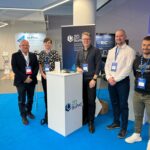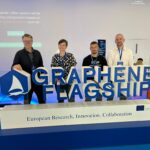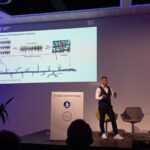Graphene Week marks the 20th anniversary of graphene’s discovery
This year’s Graphene Week, an international conference dedicated to graphene (and 2D materials) research and its applications, marked the 20th anniversary of the discovery of this groundbreaking, Nobel Prize-winning 2D material. Hosted in Prague, the event saw the active participation of CATRIN, with its scientists playing key roles in the programme. Notably, Aristides Bakandritsos, one of CATRIN’s leading researchers, served as one of the three Chairs of the conference. The organization was managed by Graphene Flagship in collaboration with three European projects: 2D-BioPAD, (coordinated by Bakandritsos), Next-2Digits, and 2D-PRINTABLE.
Since 2006, Graphene Week provides a platform for scientists and industry experts to share the latest research developments, technological advancements, and innovations in graphene and 2D materials. The goal is to boost research and development, and bridge the gap between research and industrial application, fostering innovation that can transform the European technological landscape. This year, participants also celebrated the pioneering work of K. Novoselov and A. Geim, whose research on graphene’s electronic properties was first published in Science in 2004.
“This year’s Graphene Week once again pushed the boundaries of innovation. Through expert workshops and knowledge sharing, the event helped to shape the future of advanced materials. It created a collaborative environment for researchers from across the globe, opening new avenues for research and innovation. The five-day conference featured five plenary sessions led by world-renowned experts, an Innovation Forum, an exhibition, alongside dedicated sessions on diversity, career development for young scientists, future funding opportunities from the European Commission and 2D materials of the future,” said Bakandritsos.
Among the keynote speakers was Michal Otyepka, Head of CATRIN-RCPTM, who delivered an invited lecture on graphene derivatives and their potential applications in energy storage, sensing, and catalysis. CATRIN also made its mark through the 2D-BioPAD project, organizing a parallel session, Biomed, in partnership with the MUNASET project. During this session, CATRIN researchers David Panáček and Petr Jakubec presented developments in the use of graphene materials for biosensor printing and combating antibiotic-resistant bacteria. Lucie Hrabalíková, project manager for 2D-BioPAD, shared insights from the first year of project management, in a dedicated meeting of RIA/IAs projects running under the Graphene Flagship umbrella. Meanwhile, CATRIN researchers Aby Cheruvathoor Poulose and Mahima Khandelwal contributed to the programme with oral and poster presentations, respectively.
The conference attracted over 400 delegates and 200 speakers from more than 45 countries. Next year’s Graphene Week will be hosted in Italy.









